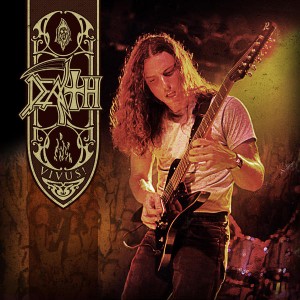
“A request to die with dignity. Is that too much to ask?” – Death, ‘Suicide Machine’
Many of my readers know that I am a fan of the metal group Death. Many of Death’s songs, much to my liking, have philosophical themes which lead listeners to ponder deep questions about human existence.
The songs ‘Suicide Machine‘ and ‘Pull the Plug‘ deal with themes of suicide — particularly assisted suicide/euthanasia — and appear to show support for people with terminal illnesses who, instead of “prolong[ing] the pain,” want to end their lives prematurely.
Vocalist Chuck Schuldiner sang, “A request to die with dignity. Is that too much to ask?,” “In death they now seek tranquility,” “Extending agony they must be blind,” and “Pull the plug let me pass away/Pull the plug don’t want to live this way” making what appears to be a compelling case for supporting euthanasia.
Newlywed Brittany Maynard, aged 29, has recently appeared in various media outlets announcing to the world that she has been diagnosed with brain cancer and has only six months to live. Rather than dying of natural causes and suffering from the brain cancer, Maynard has elected to end her life via physician-assisted suicide in an area where doing so is legal. Maynard has said, “I don’t want to die. But I am dying. Death with dignity is the phrase I’m comfortable using. I am choosing to go in a way that is with less suffering and less pain.”
Religious traditions concerned with a seemingly non-negotiable dignity of life (see here for one example from a Catholic perspective) typically oppose assisted suicide on grounds that because human life has some natural dignity [endowed by God] it should not be willfully ended under any circumstances. Catholics — using this line of thought — will generally also oppose the death penalty, abortion, and murder (although theories of just war and ideas on self defense can seemingly allow for some wiggle room with this idea of natural dignity).
A Catholic perspective arguing against euthanasia runs contrary to [non-Catholic] perspectives on personal liberties and individual autonomy which generally empower individuals to make decisions about their lives absent unjustified harm to oneself and/or others.
In the case of euthanasia, it especially seems to matter that the choice to end one’s life is informed and reasonable lest — as opponents of euthanasia would argue — undue harm is inflicted and self-destructive actions are taken. Is Maynard’s situation one in which harm and self-destructive actions are warranted?

Surely, not all reasons people have for ending their lives are informed. Mental health professionals rightly pathologize suicidal thoughts coupled with intent, means, and a plan. In the case of a terminal illness, much different than pathological plans for suicide, the case to end one’s life is compelling – there exists a chronic condition which ultimately will end one’s life and an individual wants to avoid a high level of pain. Maynard’s decision is an informed one backed with good reasons made in a right state of mind.
Perhaps this dignity of life Catholics speak of can be preserved through an early ending of life absent a high level of pain caused by brain cancer. Is there much dignity — or really any level of human flourishing — in dying a very painful death in which natural bodily functions may not function in a proper way? Ought Maynard — on a moral and legal level — to be empowered to end her life should she desire and the circumstances warrant it in a society in which we are generally granted personal autonomy and individual liberty?
While individual Catholics or other individuals may oppose euthanasia and not want to end their lives early if diagnosed with a terminal illness, I don’t believe this sentiment should be binding on all within a pluralistic society. Rather than prolonging the pain, individuals ought to have an ability to opt-out — to end their lives early given a diagnosis of a terminal disease — and make choices about their own lives without interference from governmental officials or imposition of Catholic teachings unless, of course, they desire Catholic teachings and interference from government.
We can both value life and support an individual’s moral and/or legal right to make informed decisions about their lives — euthanasia included — especially in cases of ending one’s life prematurely in the case of terminal illness. My valuing of life extends others bodily autonomy and personal liberties by which they can make informed decisions.
As always, feel free to comment below. This piece, designed to be no longer than 800 words, will not fully cover a vast topic such as euthanasia, but hopefully will inspire some self-reflection and discussion.
http://youtu.be/mSi35GRA1u4